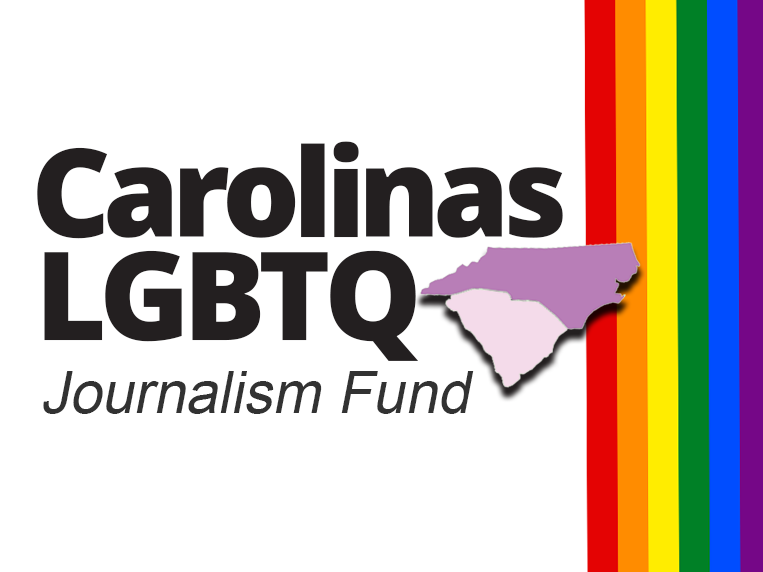
North Carolina’s qnotes launches Carolinas LGBTQ Journalism Fund to support local writers
by Chris Rudisill
(Chris Rudisill is the project manager for the QnotesCarolinas.org Project and is also the Director of the Charlotte Journalism Collaborative. The following piece ran in the May 28, 2021, issue of qnotes and is reprinted here with permission.)
In discussing a new collaborative journalism playbook released by Solutions Journalism Network (SJN), Alicia Bell said, “The future of journalism includes journalists, and it includes so many other people who have never once considered themselves bearers of the news.”
Bell, who authored the guide “Gathering Toward Solutions: A Community Event Playbook for Journalism Collaboratives,” is the Media 2070 Director for Free Press and has served as the organizing manager of the organization’s work in North Carolina through a program called News Voices.
“Community organizers will play a role in the future of news. Baristas will play a role in the future of news. There will be gardeners and retired people and students and actors,” she continued. “All of us will be there. And all of us will need information, stories and community.”

That “journalism as a community center” idea has been inspiration for qnotes and its parent company Pride Publishing & Typesetting, Inc., over the past year as it created and launched work on the QnotesCarolinas.org project. The publication celebrated its 35th anniversary last month and has worked with Free Press since 2019 as a member of the Charlotte Journalism Collaborative, a project of SJN.
In December, qnotes announced $130,000 in funding from the Google GNI North American Innovation Challenge. “We realize that it is time for our publication to evolve,” said qnotes Publisher Jim Yarbrough.
In the three and a half decades of the publication’s existence, it has connected the LGBTQ community to news stories that did not often get covered in mainstream press. Despite difficult economic years for the news industry, it continued to operate, often with no full-time staff to represent the population it serves.
While the funding allows a large investment in infrastructure to build out a new online platform, funds are still necessary to operate and pay the journalists who are delivering those stories.
“In order to receive the full funding, we still need to raise nearly $60,000 in match support,” says Yarbrough.
Shortly after the announcement in December, the Carolinas LGBTQ Journalism Fund was launched with an initial goal of raising $30,000, half of what is required. A second campaign will follow in phase two of the project. The fund is administered by Local Media Foundation, a charitable trust affiliated with the Local Media Association. It supports more opportunities for LGBTQ writers in North and South Carolina and has raised just over $10,000 so far, including a $5,000 donation from Bob Page, founder and CEO of Replacements, Ltd., based in Greensboro.
Page’s company is the largest tableware business in the world. He has fought hard for the LGBTQ community and as Passport Magazine said, “His driving force now is for social justice and charity.”
“We’re incredibly thankful for the support of Bob Page and others in the community that understand the importance of having local LGBTQ news sustained in North Carolina,” says Yarbrough.
The project will also launch community reporting workshops and town halls, a partnership with Free Press. “It is centered on community support, but also community involvement,” says Yarbrough. “We are involving our readers in every aspect of the project.”
Donations to the fund are tax-deductible and can be made online at givebutter.com/lmf-qnotescarolinas. For more information about the project, go to qnotescarolinas.org.
qnotes has been involved in the Charlotte Journalism Collaborative since its launch, adding an LGBTQ perspective to the affordable housing conversation. A second grant of $15,000 from Solutions Journalism Network (SJN) will now help the organization increase opportunities for Black LGBTQ journalists.
The project is part of SJN’s Economic Mobility initiative. According to its Medium page, The Whole Story, “The goal is to catalyze reporting that looks at both the systemic causes of poverty and potential solutions that are worth sharing.”
While amplifying the voices of more communities in North Carolina, the qnotes project will also uncover responses that can impact the lives of Charlotte residents. A 2014 study by Harvard University researchers ranked Charlotte last for economic mobility among the 50 largest U.S. metro areas. The study also found that low economic mobility disproportionately affects people of color. For instance, a Black child growing up in a low-income home can expect a household income of $21,599 a year at age 34. A white child can expect $34,256.
Multiple reports show that Black LGBTQ people face even starker disparities in economic security and upward mobility, and these have only been heightened by the COVID-19 pandemic. According to a recent call for journalists by qnotes, “This urgent problem has created the prevalence of increased research and the launch of innovative responses by grassroots organizations, policy makers and communities to improve outcomes for a community that is at the intersection of two marginalized identities.”
qnotes is seeking Black LGBTQ and allied writers to work on the project and multimedia journalists are encouraged to submit proposals. Stories should focus on rigorous investigation and reporting of regional and national responses, including their limitations, and how those solutions may impact decision-making in the Charlotte area. Stories should also include the experiences of Black LGBTQ people living in North Carolina, telling their real-life experiences while seeking to better understand the limitations that exist to overcoming structural racism and discrimination.
Writers, photographers and videographers who are interested in being a part of the project should email publisher@goqnotes.com.
“Both of these projects are helping us better serve the local community, but we need the support of people who can do so to secure the future of LGBTQ press in the Carolinas,” says Yarbrough, “Whether it be $5 or more, every amount helps us tell these stories, keep people informed and further foster that sense of community that supports us all.”
GUEST COMMENTARY
Volume 23
Issue 5








